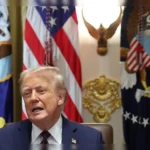
While announcing a 100% tariff on branded pharmaceuticals, the United States clarified that it will honor existing trade agreements with the European Union and Japan, ensuring a 15% ceiling on drug tariffs from these regions.
The move is being viewed as a strategic disadvantage for India, whose exporters now face far higher barriers compared to European and Japanese peers. Industry experts warn that the U.S. decision could tilt global supply chains, drawing more multinational pharma investments toward Europe and Japan at the cost of emerging markets like India.
“Washington is sending a clear signal — trade allies like the EU and Japan will be favored, while countries outside these blocs may face punitive tariffs. This is as much about geopolitics as it is about economics,” said Prof. Ramesh Babu, a trade policy analyst.
The policy shift comes at a time when India has been actively expanding its pharma footprint in the U.S. market, particularly through complex generics and biosimilars. Now, exporters fear that cost-sensitive American buyers may reduce procurement from India, preferring tariff-protected suppliers.
Though generic drugs remain unaffected, branded formulations and high-value patented drug exports may see their margins eroded. This divergence in tariff treatment has sparked calls for India to re-negotiate trade concessions with Washington.
